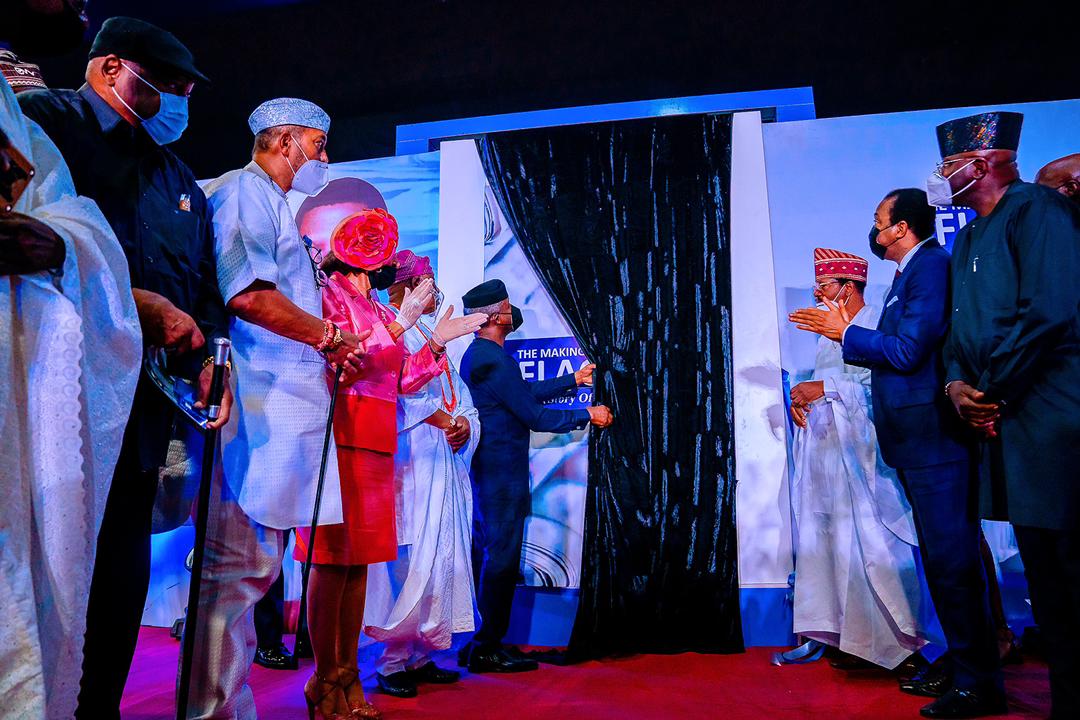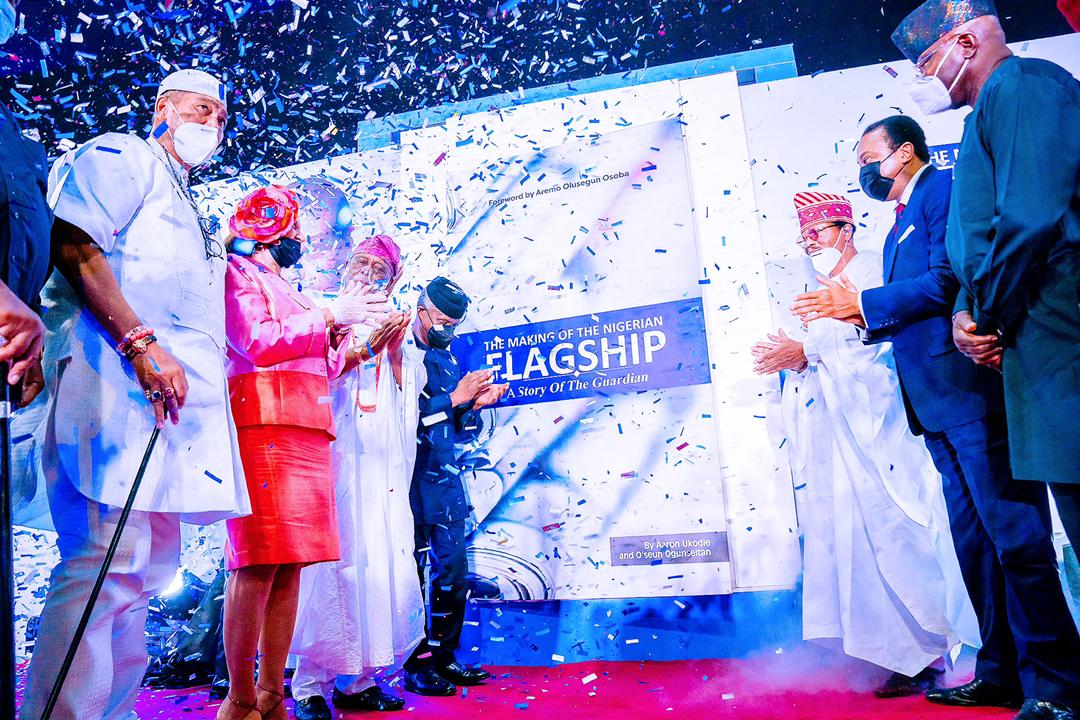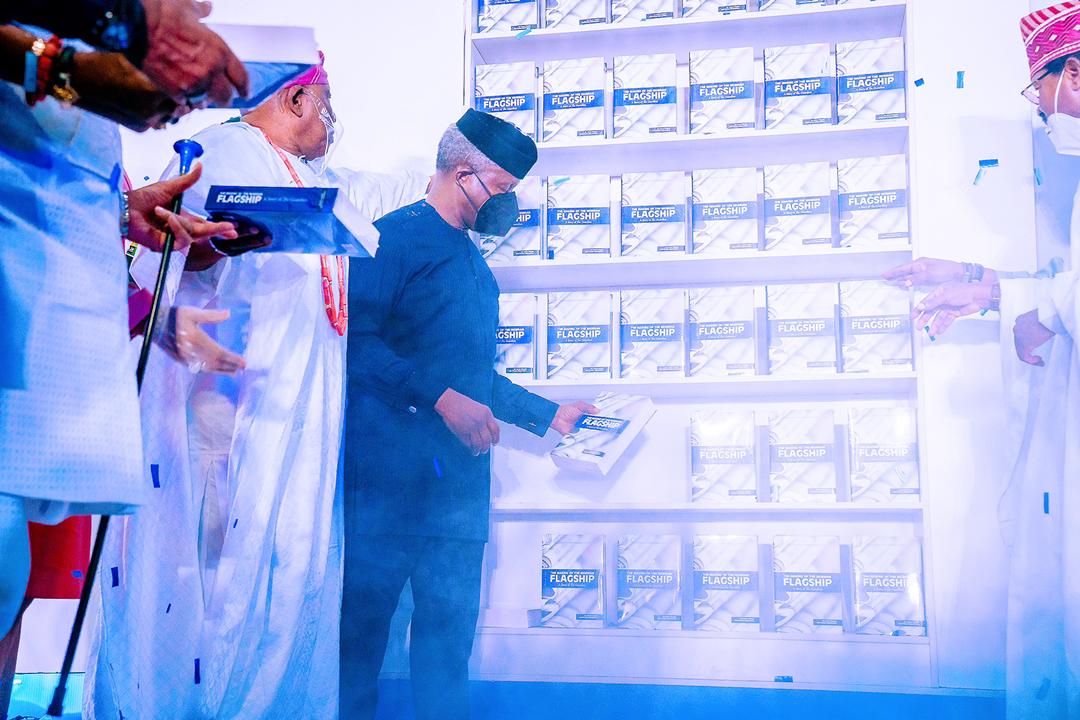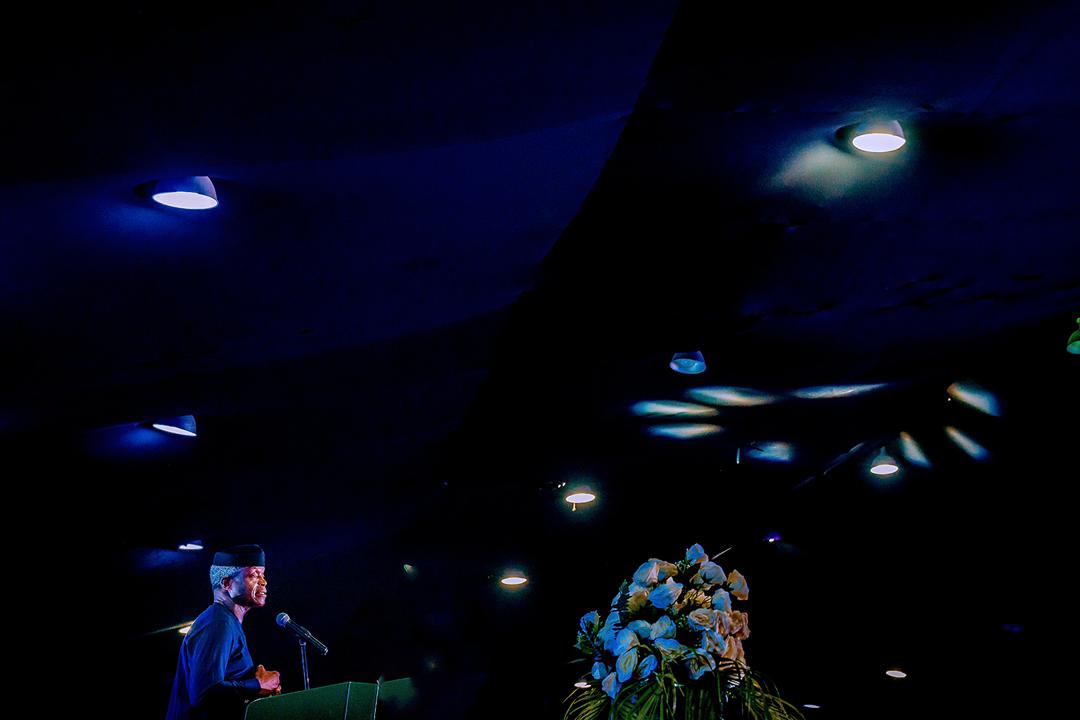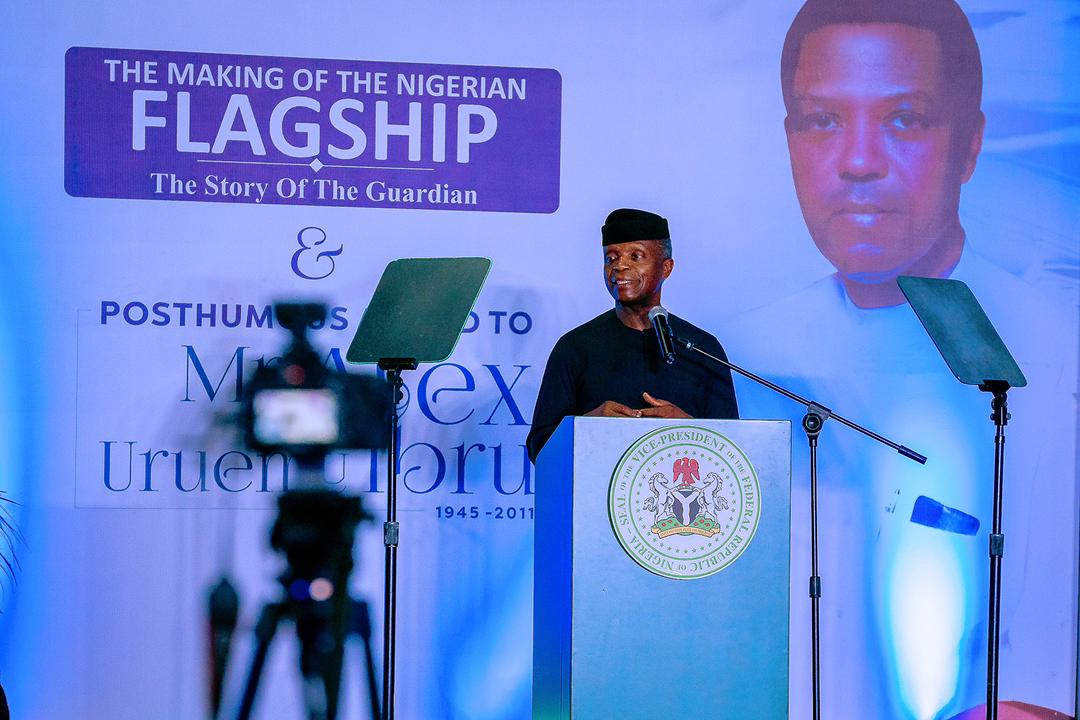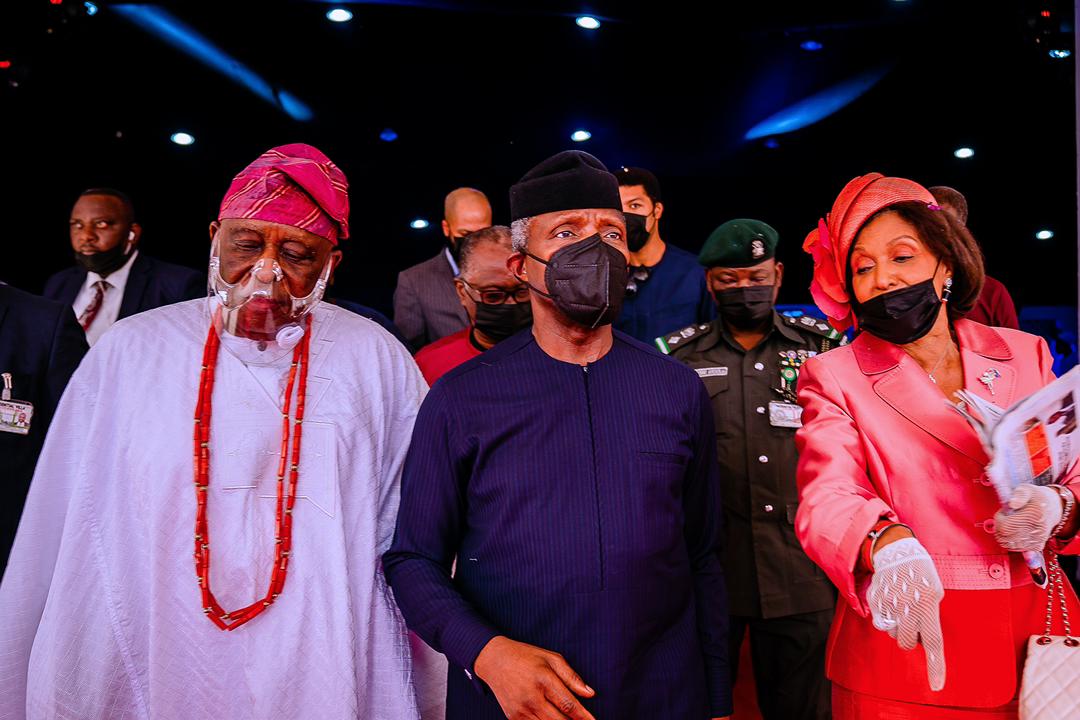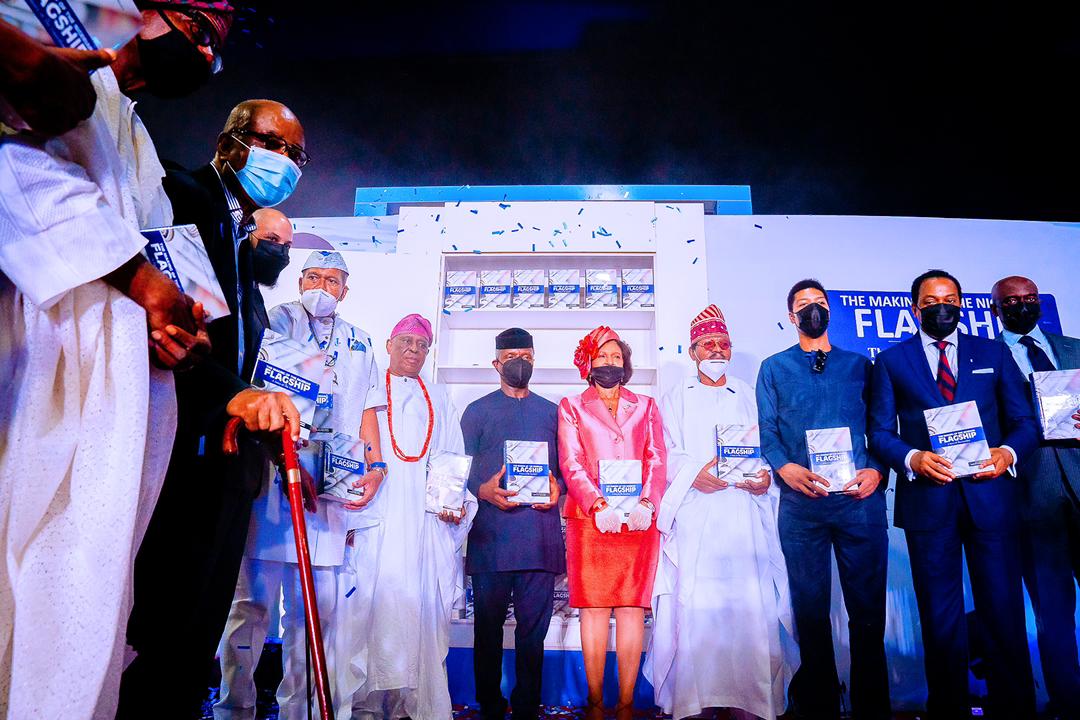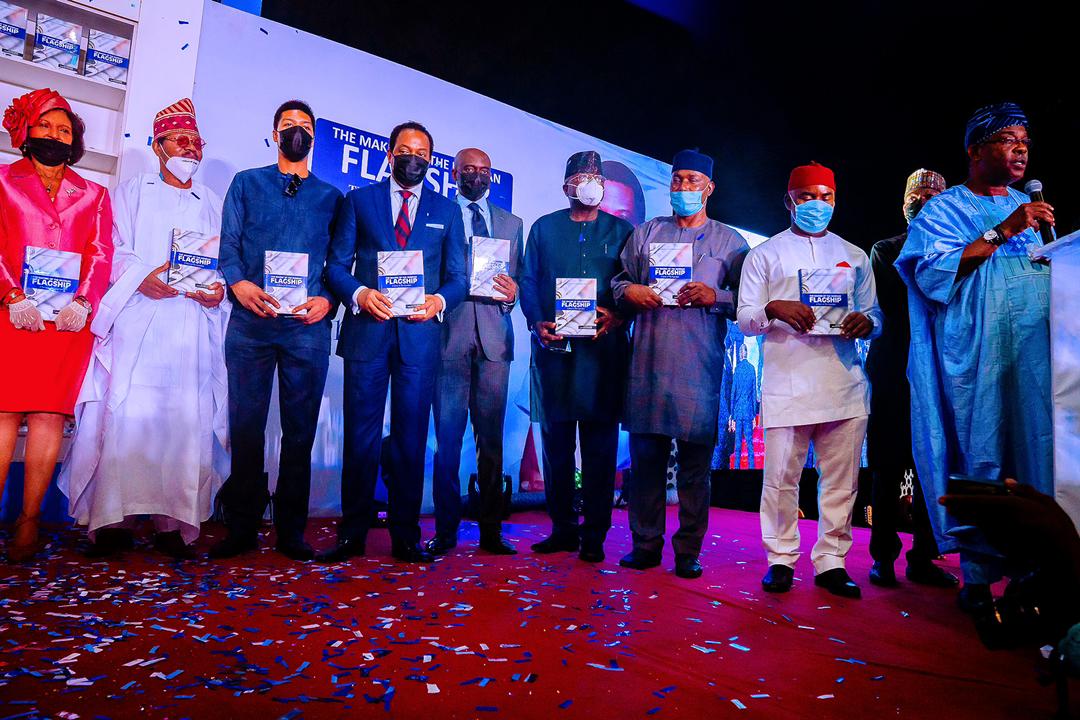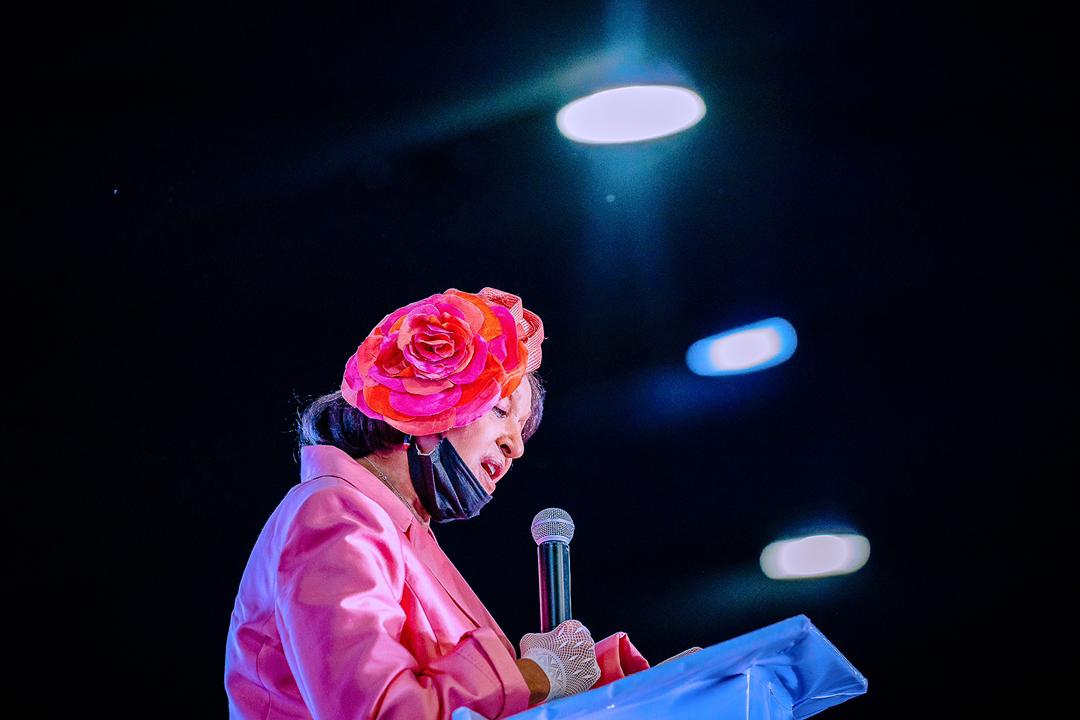The Making Of The Nigerian Flagship: A Story Of The Guardian
THE GUARDIAN SPOKE TRUTH TO POWER – OSINBAJO
REMARKS BY HIS EXCELLENCY PROF. YEMI OSINBAJO, SAN, GCON, VICE PRESIDENT OF THE FEDERAL REPUBLIC OF NIGERIA, AT THE PUBLIC PRESENTATION OF THE BOOK, “THE MAKING OF THE NIGERIAN FLAGSHIP: A STORY OF THE GUARDIAN” AND CELEBRATION OF THE FOUNDER OF THE GUARDIAN NEWSPAPERS, MR ALEX U. IBRU (1945-2011) ON THE 8TH OF APRIL, 2021
PROTOCOLS
It is a delight to be part of this unveiling of a chapter of our history – a story that has not been told in full until now. The story of The Guardian Newspaper is significant, for the redefinition it meant for print media in Nigeria, and for its uniqueness in bringing public intellectuals and academics into journalism and breeding a generation of talented journalists.
However, to grasp the significance of The Guardian, it is important to situate its odyssey within the larger Nigerian story and particularly in the context of the evolution of the fourth estate in our country.
The Nigerian press has deep roots going back almost 150 years. Indeed, the Nigerian press came into existence before Nigeria itself and was instrumental to the birthing of this nation. It is no surprise that several luminaries of the anti-colonial and nationalist movements were also leading figures in the press: Nnamdi Azikiwe, Ernest Ikoli, Anthony Enahoro, Herbert Macaulay – all venerable figures in our pantheon of nationalist icons, first established themselves as journalists of repute in what was then emerging as the most vibrant and dynamic press in Africa.
Given its origins as the fulcrum of the nationalist struggle, it is not surprising that the relational dynamic between the Nigerian press and the Nigerian state was largely adversarial in the years after we gained our independence from the British. This dynamic was accentuated by the succession of military dictatorships that seized power following the collapse of the First Republic in 1966.
Since the military rule is characterized chiefly by the abbreviation of civil liberties, the shrinking of civic spaces, and the imposition of constraints on freedom of expression, it was only logical for the press to find itself on the opposite side of a confrontation with the military regimes of that era. The peak of the tensions between the press and the military in the 1970s was the nationalization of the Daily Times.
It was in this illiberal and censorial climate that The Guardian was born. Right from its first edition which came out on February 27, 1983, The Guardian carved a niche for itself with a distinctive and sophisticated editorial style, linguistic elegance, good prose, and high-quality print standards.
Its mode of engagement was even-tempered, demonstrated in the deliberate moderation and thoughtfulness in its headlines and captions. Most of us will remember the news stories of the alleged death of the great Zik in 1989. Many newspapers ran screaming headlines “Zik is dead,” “the great Owelle of Onitsha passes on,” “Nigeria first President dies.” Some even reported the formation of a national burial committee, we all reached for The Guardian, whose headlines in typical “Guardianese” were simply, quote “Zik dead, alive, jubilation in Nsukka.”
Chude Pride a young journalist then had taken the trouble of investigating the story, with a visit to Chief Adeniran Ogunsanya, a longtime friend and confidant of Zik, who said he had just spoken to Zik. As it turned out, the great Zik was not only alive and well, but lived for almost another 7 years thereafter. Unfortunately, the gentleman touted as the burial committee chairman in some news reports passed on even well ahead of the great Zik.
The Guardian quickly set itself apart as an outpost of liberalism populated by intrepid journalists and keen-minded intellectuals devoted to freedom of thought and inquiry. Its op-ed pages quickly became the arena of choice for the defining public debates of the day.
The media landscape of the 1980s was not bereft of idealists, ideologues, and intellectuals with visions of remaking society. What was unique about The Guardian was that it represented a rare but potent combination of an abundance of ideas and a wealth of resources. It was a happy marriage of socially conscious intellection and missionary capital.
In other words, there was a cast of insightful thinkers with a profound understanding of the Nigerian media landscape, who were eager to make a change. But the change could not have happened without an entrepreneur who shared that vision, a co-visioner, Chief Olusegun Osoba, while Dr. Stanley Macebuh, Dr. Patrick Dele-Cole, Mr. Lade Bonuola, Mr. Femi Kusa, Dr. Eddie Iroh, later joined by Dr. Yemi Ogunbiyi and Mr. Nick Nduwe formed some of the core team of thinkers behind The Guardian. Mr. Alex Ibru was that visionary investor that was courageous enough to trust the thinkers.
To find a businessman that could trust a group of intellectuals with editorial freedom in the treacherous socio-political climate of the time as Alex Ibru did, was clearly exceptional. His calm deportment belied his understanding of the terrain, his foresight, and his propensity for risk-taking. He truly typified the idea of the capitalist-driven by conscience. His courage of conviction exemplified in the actualization of The Guardian will remain indelible.
I have dwelt a bit on the nature of this partnership between people of means and people of ideas that gave us The Guardian because I believe that it is the sort of transformative synergy that we need to see more often especially in order to drive our quest for a better society. We need partnerships across the broad spectrum of civil society and the private sector.
The Guardian harked back to the proud and illustrious tradition of the Nigerian press that practiced journalism with a social mission and a commitment to speaking truth to power. It played an important role in the struggles that birthed our democracy, suffering proscription and the firebombing of its business offices at Rutam House. Alex Ibru, himself, narrowly survived an assassination attempt in which he was severely injured. Years later, I confronted the horror of the attack on him myself, when as Attorney General in Lagos, it was my lot to prosecute his assailants. It was a reflection of the terrible costs that journalists bore as they continued to heroically ply their craft as an act of resistance against tyranny.
For decades, the men and women that work at The Guardian have drawn inspiration from the immortal words of Uthman Dan Fodio on its masthead: “Conscience is an open wound. Only truth can heal it.” It is the role of journalists to tell the truth even when it is inconvenient. This mission has a special resonance in this day and age.
Even as we strive to make governance more transparent and accountable in its workings, and to abandon the habits of secrecy and opacity that became deeply ingrained during the era of military rule, we have realized that abuse of state power is not the only threat to the liberal tradition. Right now, we also have to deal with issues such as the proliferation of fake news.
Almost daily, fake news or mischievously manipulated news is trafficked with the clear intent of warping the perception of reality and inducing conflict.
It is said that journalism is the first rough draft of history. It is true that reportage shapes the perception and understanding of events. It shapes memories and can influence behaviour for good or for ill. There are arguably no bigger influencers than those who report and interpret the world to us. This is considerable power and it comes with responsibility.
About four decades ago, The Guardian set new standards that forever transformed the practice of journalism. Today a more complex media and information landscape require a corps of professionals to set new standards and raise the quality of the fare on offer.
The pioneers of The Guardian understood that journalism operates in a social context and cannot be value-neutral. This same cognitive commitment is incumbent upon all media practitioners today. We are at a time in our national odyssey in which retailers of discord and merchants of strife are working assiduously against our collective potential as a people. Creating commonality of purpose in ethnically and culturally diverse societies is challenging the world over. However, nation-building is not the sole preserve of politicians and governments; in fact, it is just as much a task for civil society of which the press is an important member.
It is true that freedom of expression is enshrined in our constitution, but we all agree that society, progress, and order depend upon the responsible exercise of freedom, otherwise, the end result will be anarchy. As we struggle to build our nation with the bricks of mutuality, plurality, and tolerance, I would suggest that those of us that stand as gatekeepers in the fourth estate must demonstrate a greater awareness of the sensibilities and sensitivities of our society.
I think in sum, what The Guardian has embodied in these past years is a fidelity to the principle of balance, objectivity, and fair-hearing, not only as a corporate culture but also as a moral obligation to the larger society; that insistence by the gatekeeper that leads are well investigated and reports are well researched before the copy is passed for publication. The restraint to leave out a claim when in doubt.
In summary, it is what, in my humble view, prequalifies a newspaper to become a marketplace of ideas or what the great American playwright, Arthur Miller, had in mind when he said, “A good newspaper is a nation talking to itself”. I think time and time again, The Guardian has shown that it is possible to be critical without being destructive, constructive, and not be compromised.
Perhaps what I like most about this book is that it is a mosaic of memories by different generations of The Guardian. It is also a reminder of just how many journalists passed through the paper during the course of their careers.
The Guardian is no longer just a newspaper house, but a public institution – one that has served as an exemplar and a model for generations of media practitioners who replicate its ethos and standards in different ways.
By documenting the rise of The Guardian, Aaron Ukodie and O’Seun Ogunseitan have additionally reminded us particularly of how the present can be shaped by the past. But more importantly, how what has been done merely reveals what more can be done.
We all must commend the authors and The Guardian Newspapers and especially the chief custodian of the legacy, Lady Maiden Alex-Ibru for broadening our understanding of history, for the appreciation of the present, and for inspiring the future. I wish you more success in the years ahead.
It is now my very special privilege and honour to present “The Making of the Nigerian Flagship, the Story of The Guardian.
God bless you all.
God bless the Federal Republic of Nigeria.


